I like fantasy stuff as much as the next guy.
Swords, castles, dragons, battles, flowing robes and armor, trolls and elves and wizards?
Yes, they’re all fine.
Not that I have read or own a ton of fantasy, but it shows up enough in my personal library to enjoy it – from Camelot to Middle-Earth to Narnia and Westeros.
There is something special about building a world: Figuring out the rules, the people, the customs, the geopolitical framework, economies, and all the competing interests from which the conflict will arise and the story will progress. Unlike our world, this place can make total sense. You can hold it in your hand. And even if its daily news depresses you, just close the book or turn off the game and walk away.
And like the best parts of all fiction, there is an aim to entertain but also provide a mirror to the real world, using those reflections to illustrate the human condition. Whether it’s ideas of the moral good, duty and honor, ecological responsibility, war, love and romance, even the tale of a magic ring can inform us about how we operate in the real world.
Which is why, as a black nerd, I am always thinking of how the majority of fantasy fiction represents people and culture in racially insensitive ways.
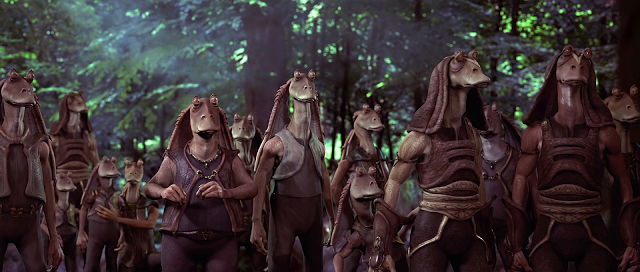 |
| Exhibit A… |
This is no surprise, but Western culture has spent so much time wrapped up in racism via histories of conquest and war – not only by elevating white people and denigrating people of color around the globe, but also by promoting certain types of white people over others.
It’s difficult to escape these biases toward parts of north-western Europe in pretty much anything. And fantasy? Yeah, it’s in there. A lot.
I understand that because of our world history being dominated by Europe, a lot of our literary traditions, especially as related to the English language, will be colored as such. The fantasy genre is built on the historical legends that came out of European traditions, so it’s no wonder that the genre is Eurocentric.
The issue is when that Eurocentricity comes at the exclusion or denigration of other people or culture, and how, when combined with economic interests, develops into bigotry (attitudes) and full-on racism (systemic oppression). Because of our long, long history of bigotry and racism sneaking into and shaping so many facets of life, at this point it can be tough to create something absent those issues or not reinforcing them in some way. Racism becomes like air: you can’t see it, but you’re breathing.
At the very least, there’s a racial insensitivity, whether intentional or not. That’s the fun of racism – it sucks up nearly anything, and over time we have developed racially coded imagery and material. Fantasy is not immune. Often it comes through by the depiction of barbarians and savages, as compared to the civilized people who are the main characters.
As much as I love the Lord of the Rings films, it was a bit uncomfortable seeing the evil Uruk-hai, dark-skinned, hooting and hollering, covered in face paint and matted hair.
All the good races in Middle-Earth are fair-skinned, and the more elevated/powerful the race, the whiter they get – hello, Elves. Compare them to the nameless, Arab-like Haradrim.
Or take the TV version of Game of Thrones. The finale to Season 3 had a couple of moments that felt racially insensitive, whether on purpose or not. I couldn’t watch the sad scene between Ramsay Bolton and the now-emasculated Theon Greyjoy without there being a shade of the “Your name is Toby” scene in Roots. And then there’s Daenerys immediately hoisted above a sea of brown people calling her mother.
The story of Daenerys is at the crux of my racial quibbles on the Game of Thrones series. The warring clans in Westeros, all played by white actors, are plenty savage with all the maiming, incest, misogyny and occasional child murder. Yet the Dothraki people across the sea in Essos, played by a hodgepodge of brown-skinned actors, are viewed as barbarian and extra-savage. Hey, as least people in Westeros aren’t eating horse hearts just ripped out of the animal! That’s just too far.
As the series goes on, we see Khal Drogo die, and Daenerys – his blonde, white queen – assume the leadership of Drogo’s khalasar. The classic trope of the white outsider taken in by ethnics and then becoming their leader. (Yep.)
She then goes on to buy a nondescript army of 8,000 brown-skinned slave warriors, who choose to stay after she frees them. (OK.) We know none of them except for Grey Worm, who decides to keep his slave name rather that his birth name. (Really.) He gets a few lines over the course of five episodes Season 3.
And in two seconds Yunkai is liberated, and we see Daenerys being called mother by multitudes of brown people. (Welp.)
I’m not exactly up in arms about these images. I don’t really think Martin’s books or the Game of Thrones TV series is racist or trying to give thought to a racist agenda. But the images matter, and can be even more powerful if they don’t have the content to back them up.
Perhaps I would have liked the final scene of Daenerys and the Yunkai slaves more if the episodes had allowed for more screen time. It felt kinda rushed at the end of the episode. Or if we had more from the point of view of the slaves themselves, speaking their own languages to each other.
Fine then, you say. There’s the racial insensitivity you claim. What are you going to do about it?
The next step is obvious, and it comes in the phrase “be the change you want to see.”
I am on the lookout now for more non-Eurocentric fantasy fiction, particularly of the Afrocentric variety. (China and Japan have long, long histories of this literary tradition related to their own peoples and histories.)
A shorthand expression for this is an African Lord of the Rings. Something that incorporates the traditions of storytelling and mythology across the hundreds of peoples in the African continent and repackages them into its own unique story. To create that great swords-and-sorcery epic from an Afrocentric view.
I’m fine with Eurocentric fantasy books doing their thing, as long as we can widen the conversation and get the Afrocentric fantasy books on the same shelf in the bookstore, and perhaps one day at the box office. Isn’t it kinda ridiculous that Will Smith, the biggest freaking Hollywood movie star left, hasn’t made a sword-and-sorcery epic? He can punch aliens in the face several times over, but he hasn’t swung a sword.
These stories are out there, at least on a small press basis, and I am gunning for them.
At the heart of this is Charles Saunders, who created the African sword-and-sorcery hero Imaro more than 30 years (!) ago. He called this specific genre Sword and Soul. I need to get my hands on Griots: A Sword and Soul Anthology – 14 stories based on building their own worlds rooted in African mythology.
In Arthurian lore, there is the story of Sir Moriens, the Moorish son of Sir Algovale and a North African princess. Michael Russell Thierry has written The Black Knight, his own take on the story that he plans to make into a three-book series.
Stafford Battle is working on Afrocentric sci-fi, fantasy and speculative fiction. His Afro Sci-Fi collection includes a story of two warriors in ancient Africa who battle for the love of a priestess who has been promised to be the bride of a dying god.
I need to read some Alicia McCalla. She does black-themed sci-fi, superhero and paranormal fiction, following in the footsteps of the late, great Octavia Butler. Gotta see if she’s got a sword-and-soul story out there. If she doesn’t, she likely has blogged about someone who does.
This is only the beginning. I’m educating myself. Time to be the change I want to see.
Join me, and let’s build these worlds for a while.





































































































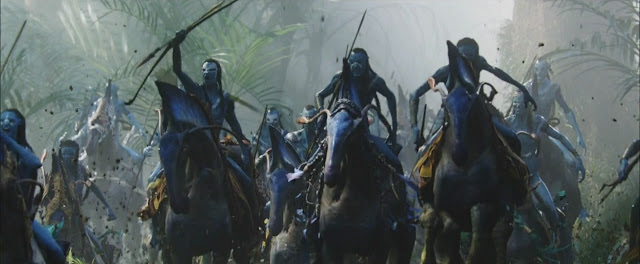
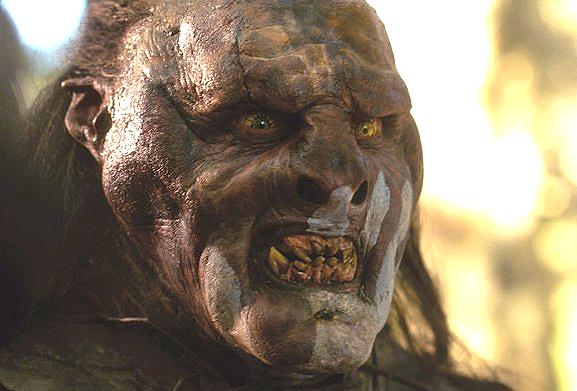
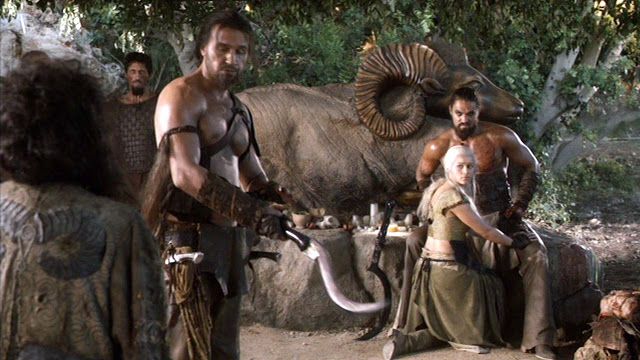
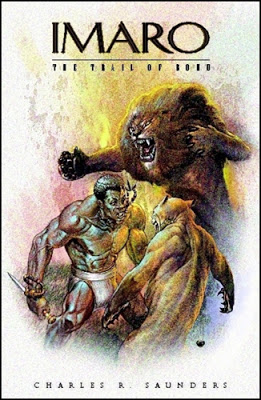
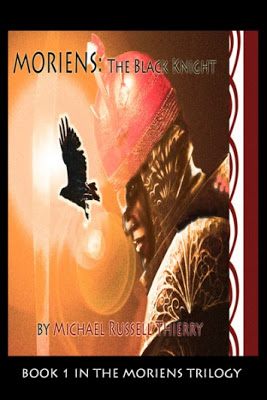
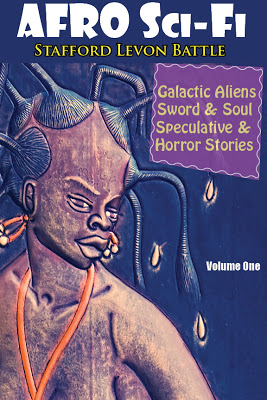









2 Comments